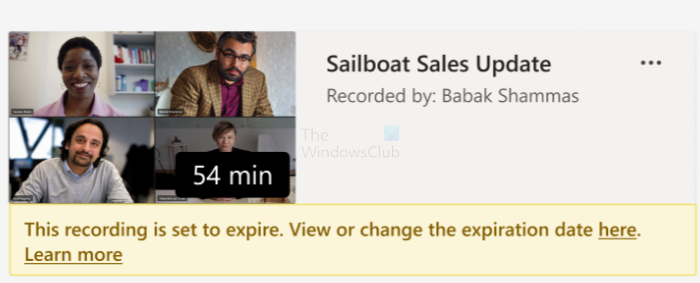Microsoft Teams, like any other video conferencing tool, allows the hose to record the meeting. These meetings can be shared by the host with others or kept private. Some users have reported issues with this feature where the person is not able to find the recording or is only able to hear audio, or sometimes the audio recording is missing. In this post, we will look at all these situations.

Microsoft Teams Recording is Missing
Before we start, if you cannot hear the audio in Teams, you need to check if the default audio is to the speaker or headphones you are using to listen to the audio. Coming back to the Missing Teams recording, let’s get through the steps involved to resolve this issue:
- Where to find Teams Recordings
- Check if Teams Recording has expired
Some of these settings can only be checked by the person who started the meeting.
Where to find Teams Recordings
Microsoft Teams is available on the consumer and corporate levels. According to Microsoft, recording storage locations differ depending on the type of meeting.
- SharePoint if it was a channel meeting or OneDrive for any other type of meeting.
- If you are meeting on a channel, it shows up in the meeting chat or channel conversation. You can find it in a Recordings folder in the Files tab for the channel. Everyone on the channel will be permitted to view the recording.
- Non-channel meetings will be recorded in the Recordings folder in the OneDrive directory of the person who started them.
Meeting recordings can only be downloaded by the meeting recorder and organizer. The other attendees will only be able to view it.
Check if Teams Recording has expired

At the organization level, administrator settings can decide when the recording will expire. Usually, the notification about the expiration date is mentioned along with the recording in the channel. So if you are trying to find the meeting after that, there is no way out.
However, there is a catch. When the recording expires, its owner will receive an email. If they decide to retrieve it from the recycle bin, they’ll have 90 days to do so. So the best way would be to connect with the person and restore it.
I hope the post was easy to follow, and you clearly understood where to find the missing Microsoft Teams recording. A lot goes around when using Microsoft Teams in Organization, so it’s important to clear your doubts regarding permission with the admins.
What are the Pre-Requites to Record Teams Meeting in a Company?
The following prerequisites are required for both the meeting organizer and the person who is initiating the recording:
- Licensed for Microsoft Stream
- Microsoft Stream upload video permissions
- Consented to the company guidelines, if set up by the admin
- Sufficient storage in Microsoft Stream for recordings to be saved
- TeamsMeetingPolicy-AllowCloudRecording setting set to true
- The user is not an anonymous, Guest, or federated user in the meeting
How to Enable Transcription for User Meetings?
To enable transcription for a user’s meeting, their Teams meeting policy must have the AllowTranscription option set to true. If that is enabled, the user can click on the three-dot menu and the Start transcription menu item to initiate the process.
Which version of Microsoft Teams can record meetings?
It is available for the Desktop version of Teams and the following licenses: Office 365 E1, Office 365 A1, Office 365/Microsoft 365 A3, Office 365/Microsoft 365 A5, Microsoft 365 E3, Microsoft 365 E5, Microsoft 365 F1, Office 365/Microsoft 365 F3, Microsoft 365 Business Basic, Microsoft 365 Business Standard, Microsoft 365 Business Premium SKUs.
How do you secretly record Microsoft Teams?
You can use third-party screen recorders to record both audio and video. However, you need to ensure the sound goes through the recorder so the recording can be saved. If you want to do it, you can choose to record using a microphone.
Can I record a Teams meeting if I am not the host?
It will depend on the role of the users who are invited to the meeting. If you invite users as presenters, they cannot only record teams meeting without permission. They will be able to remove and add others. Attendees are restricted to Speaking and sharing videos, participating in meeting chats, and privately viewing a PowerPoint file shared by someone else.